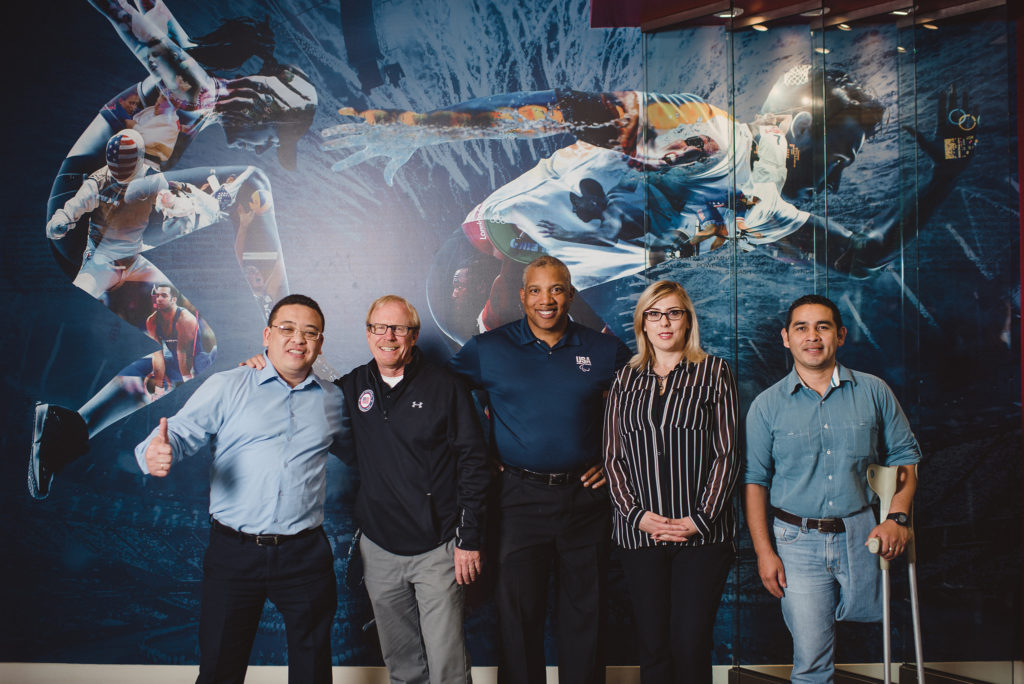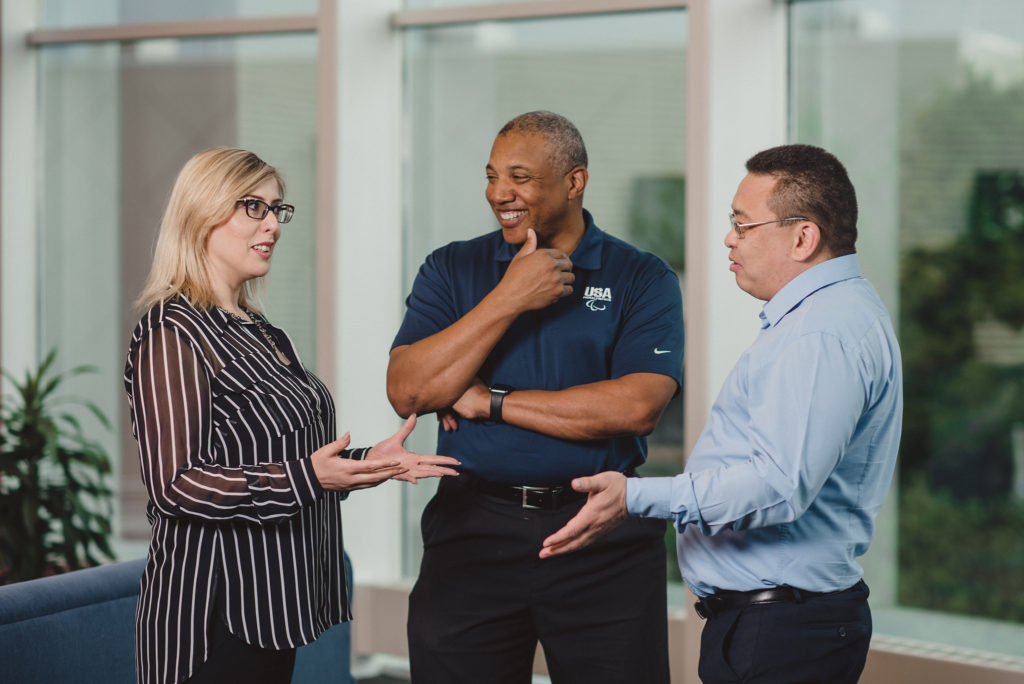Paralympic Executives inspired by experience at U.S. Olympic Committee
By Brian Canever, Center for Sport, Peace, & Society September 06, 2016In May 2016, the GSMP: Sport for Community program provided the opportunity of a lifetime to Paralympic executives from Kazakhstan and Kosovo. For three weeks, Yerlan Suleimenov, executive director of the Kazakhstan Paralympic Committee, and Njomza Emini, president of the Kosovo Paralympic Committee, experienced life at the U.S. Olympic Committee headquarters in Colorado Springs. During their time there, the pair was mentored by John Register, a two-time Paralympian in track and field whose distinguished career as a community leader and speaker spans more than two decades.
The USOC is the national committee for both the Olympics and Paralympics in the United States, the all-time leader in medals for both competitions. In 2001, U.S. Paralympics was established as a division within the organization that is responsible for selecting and managing the teams that represent the U.S. in the Paralympic Games. The division is also tasked with supporting Paralympic community and military sports programs around the country.
John, associate director for community and veterans programs for U.S. Paralympics, worked closely with Yerlan and Njomza to develop plans that would allow their own committees to flourish. A Paralympic silver medalist, John utilized years of experience navigating the worlds of high-performance sports and community engagement to guide his emerging leaders during their three weeks together.
“Working with Yerlan and Njomza has been wonderful because they have different leadership skills, but share the same focus on their missions,” John said. “Njomza is very diplomatic and strategic in the way she asks questions because she wants to have Kosovo recognized by the International Paralympic Committee so they can compete in the Games. On the other hand, Yerlan is trying to find a template for how Kazakhstan can be more successful at that level, so he is constantly asking questions and trying to soak up information. He will not give up until he finds the knowledge he wants.”

Yerlan Suleimenov and Njomza Emini were joined in Colorado Springs by Bayron Lopez, who was mentored at the U.S. Association of Blind Athletes
Yerlan, a below-the-knee amputee like John, is serious and determined about developing the Paralympic movement in Kazakhstan, a country which has participated in a combined nine Winter and Summer Games. He considers it part of his patriotic duty to improve on the country’s medal count, as well as to increase collaboration between federations to see greater equity and inclusion in the sports world.
“I have the skills to make change a reality,” Yerlan said. “I know how to speak the language of executives and how to speak to government and stakeholders. Through the committee, I have a great dream that one day our athletes will stand alongside one another, Olympians and Paralympians, bearing the flag of Kazakhstan at the medals podium.”
Yerlan was also challenged by John to view his work outside of the executive obligations with the organization. In all aspects of his life John has worked diligently to set an example that reshapes perceptions of disability. And he believes that Yerlan can do the same in his context.
“I know that I can be the inspiration John is in the U.S. to the people of Kazakhstan,” Yerlan said. “I see how the attitudes of people can change when people with disabilities advocate for their rights, like the way they fought in the United States to have the American with Disabilities Act. I can also tell my story to change the attitudes toward disability in Kazakhstan.”
Njomza, who in addition to her role with the NPC has served in Kosovo’s parliament since 2008, worked with John to develop a strategic plan for gaining the IPC recognition that will allow Kosovo to participate in future Paralympic Games. As that process continues, she will continue to organize adaptive sports events that focus especially on getting children with disabilities involved in social activities that can greatly benefit them outside of the sports arena as they grow older.

Njomza and Yerlan developed a close professional relationship and friendship with John over three weeks
“Kosovo is a new country and if we want to build a successful democracy we should have equal opportunities for everyone in our society,” Njomza said. “This must be more than just a law passed by the government. We must focus on integration in daily life. A disability is not the fault of any person and they should not be punished for being disabled. We should create the space for them to have access in all areas.”
Although they all work with different purposes in mind, John, Yerlan, and Njomza are all committed to sport because they believe in its special ability to make the world a better place.
“Sport is a connector,” John said. “You can go anywhere in the world, then take a soccer ball and just throw it out into the open field, and everybody from every social and economic background will come out to play the game. We bond around social engagements and sport is one of those unique activities that can bring everyone together.”
View more photos and quotes from the Center’s visit to the USOC to see Yerlan, Njomza, and John on Facebook (link)
